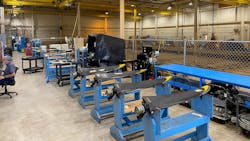Piedmont Propulsion Provides Quick Turns for T-6
Piedmont Propulsion Systems has supported the US Air Force and Navy's T-6 turboprop trainers for over four years. The aircraft sport a Hartzell four-blade metal propeller, which Piedmont Propulsion is contracted to maintain and overhaul.
Paul Bolton, chief operating officer at Piedmont Propulsion Systems, said they service around 740 aircraft between the Navy and Air Force combined. All the work is done at their Winston-Salem, North Carolina, facility.
Piedmont Propulsion has made considerable investments to ensure they meet the military's requirements, as the government requires a 30-day turn time.
“We made a big investment in bulk inventory. We'll hold over a million dollars’ worth of inventory to ensure we don't have any turn-time issues. We also have two dedicated trucks with trailers and racks that can carry up to 18 props on each truck," said Bolton.
One of their trucks is on the road each week minimum, picking up and returning propellers to nine major facilities spanning from Texas and Florida to Mississippi and Oklahoma. Bolton estimates they're overhauling 15 to 20 propellers a month on average.
Corrosion Concerns
The overhaul cycle for the T-6 propellers is 3,500 flight hours or 72 calendar months.
Bolton estimates unscheduled maintenance makes up roughly 30 percent of the work they see. Corrosion is the leading cause of it.
“The environments they're flying in are fairly harsh. From Whiting Field, Pensacola, Corpus Christi Naval, all those naval facilities, they're flying straight out over saltwater. So, lots of corrosion issues that we have to look at," Bolton said.
Piedmont Propulsion has worked with Hartzell and the Navy on reducing these corrosion issues. They've explored using different corrosion inhibitors and different surface preparation where dissimilar metals on the blades and counterweights come in contact.
“We did a very big program with the Navy, specifically. They were a lot more hit with it. And we've seen the benefits of that now, where we have seen a reduction in the corrosion coming in through the overhaul propellers and having to change fewer components," Bolton said.
Foreign object damage (FOD) is another cause of concern. A chipped blade can allow corrosion to set in if it's not detected and repaired during field inspections.
Overhaul Process
Whether in for scheduled or unscheduled maintenance, the maintenance process begins with removing paint from the blades.
"Our goal is to get them torn down and blasted, remove any paint so that we can do a full inspection including NDT [nondestructive testing] within the first five days," Bolton described.
At that point, Piedmont Propulsion will send out any parts that require cadmium plating – the only work Piedmont Propulsion doesn't do in–house.
While parts are out for cadmium plating, a detailed inspection is done on the larger components, such as the blades and the hubs.
“The blades, we put them through the air scanner, which checks the profile, the thicknesses and essentially the airfoil profile of the blades. We'll then grind the blade to remove any damages as required within the OEM/CMM specifications," Bolton said.
Next, the blades will be rechecked to ensure they're within the requirements and all that data will be provided within the inspection and the condition reports. Hubs and springs also will be checked.
“We go through the inspection and repair process on all of the parts. We should have everything back then from cadmium plating and carry out any final inspection. Then blades and hubs are painted. And then final assembly will usually take a couple of days, tops," Bolton said.
Throughout the process, quality control (QC) oversees the work with various signoffs along the way before ultimately performing the final inspection.
“It's very detailed. That's one thing for the DOD [Department of Defense], the final inspection requirements are probably a little more than our standard general aviation customers," Bolton said.
The propellers are then wrapped to protect them and mounted onto the truck for return to the base.
Work Management
Bolton said the most challenging process of maintaining the T-6 propellers is managing the turn times, especially when the shop is doing close to 20 propellers at a time.
To help, they've invested in production planning software to schedule work throughout the shop.
“We have a schedule every day. We run the schedule and it provides the work requirements for the technicians every day at a task level. So each morning they'll come in, and it provides them a printout of their requirements for the day," Bolton said.
Piedmont Propulsion hired six additional technicians when they were awarded the T-6 contract to help with the increased workload, along with additional QC.
The investment Piedmont Propulsion made to their inventory upon being awarded the contract means they keep a great bulk of parts and supplies on hand, easing the supply chain constraints the entire aviation industry has faced of late.
“I think we saw it coming. And what we have done is ensure that we hold probably six months' worth of inventory on the shelf based on what our requirements are. And then we have a lot of triggers within our ERP [enterprise resource planning] system that show us if we see a part that the delivery data is being pushed out or a certain resin or glue or paint or something where the OEM has changed the delivery a couple of times, then it's a bit of a flag to say, 'Right, we need to keep an eye on this,'" Bolton explained.
He also credits Hartzell with doing a great job of staying on top of part demand.
All combined, Bolton said that even through the worst of COVID, they could keep going steadily with the work.
“It's been a really good program for us. I think, hopefully, we've performed to the requirements and beyond," Bolton said.






